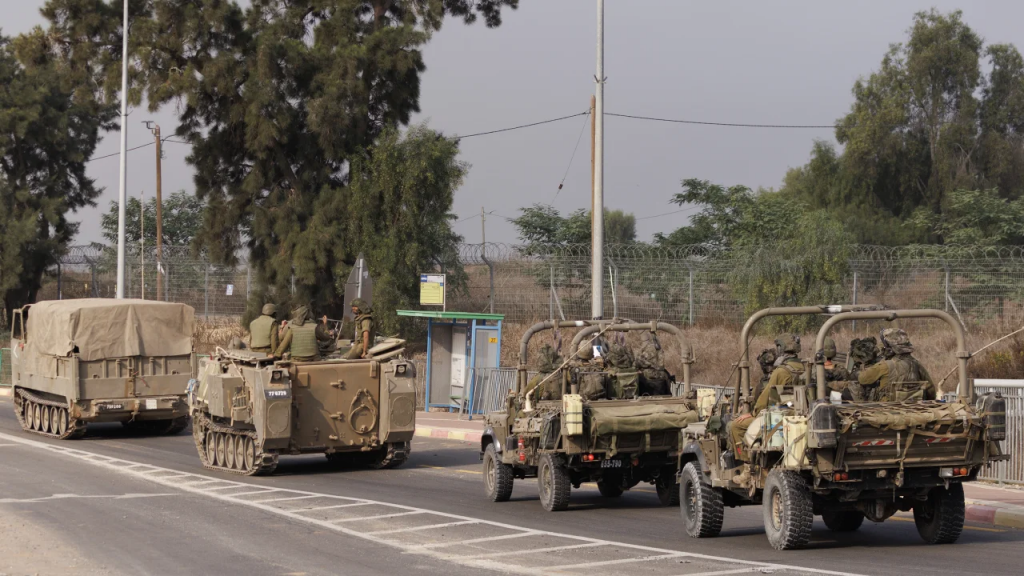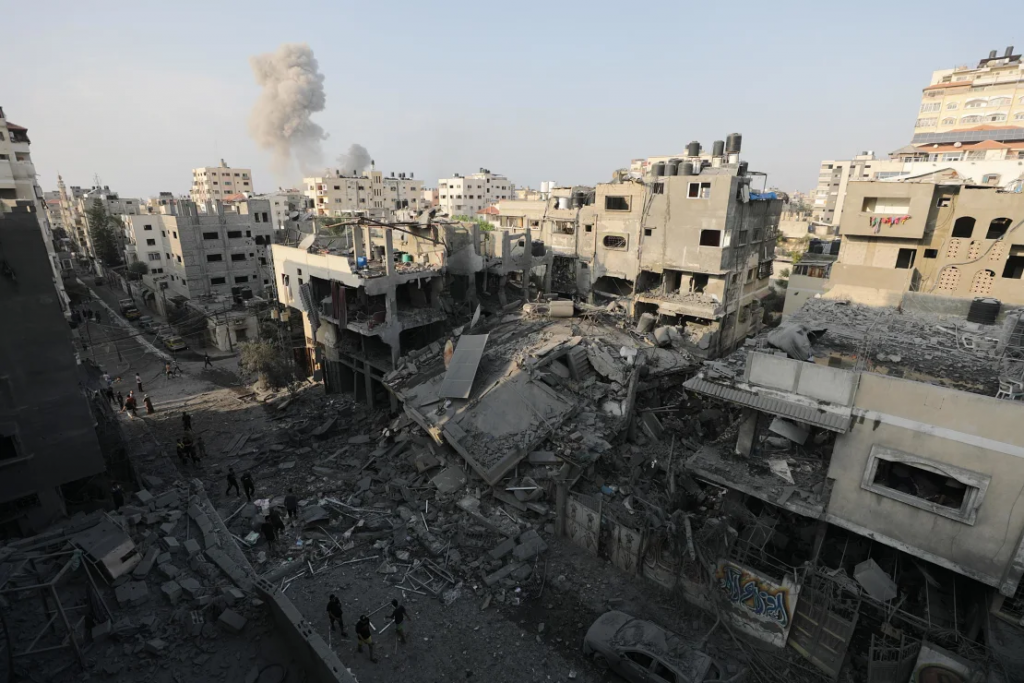
Gaza/Jerusalem — The Israeli military said Sunday it was “increasing the urgency” of its calls for people in northern Gaza to flee south, a day after Prime Minister Benjamin Netanyahu said Israel had launched the “second stage” of its war against Hamas.
Israel Defense Forces (IDF) spokesperson Rear Adm. Daniel Hagari made the call in a video posted Sunday morning — reiterating a warning the United Nations (UN) and humanitarian groups have criticized, pointing to the challenges of moving within Gaza while it is under attack.
It’s unclear how widely Gazans received that most recent call as communications severed across much of the territory since Friday night were only partially restored as of Sunday morning.
“The war inside the Gaza Strip will be long and difficult — and we are ready for it,” Netanyahu declared in a rare statement and press conference Saturday, after expanding ground operations inside Gaza where residents are scrambling to survive amid intensifying bombardments.
He said his government’s aims were to destroy the “military and governing capabilities” of Hamas and to rescue the more than 200 hostages that the militant group captured during the October 7 terror attack on Israel that sparked the latest conflict.
Israeli officials on Saturday confirmed a significant expansion of what it had described as “targeted raids” in the Hamas-governed Palestinian enclave of Gaza earlier in the week, saying ground forces had entered the territory overnight Friday.
However, it does not appear as though any major ground offensive aimed at seizing and holding significant amounts of the territory is yet underway.
“We attacked above ground and below ground. We attacked terrorist operatives at all levels, in all places. The instructions to our forces are clear: The operation will continue until a new order is given,” Israel’s Defense Minister Yoav Gallant said in a joint appearance with Netanyahu Saturday.
CNN reporters near the Israel-Gaza border described an “eruption of activity.” From Sderot, Israel, Nic Robertson noted fighter jets, artillery fire and “huge flashes on the horizon” in the direction of Gaza on Saturday evening, in an apparent “step-up” from activity on the previous night.
The ground incursion and intensified bombardment come as international calls for a ceasefire grow louder, with 120 nations at the UN calling on Friday for a “sustained humanitarian truce” in Gaza.
Already dire conditions inside the strip have cratered further after communications went down in the area — deepening challenges for medical services in the densely populated territory that’s home to more than 2 million people and facing shortages of fuel, water and fuel.
At least 7,650 people have been killed and more than 19,450 more injured in Israeli attacks on Gaza since October 7, according to the latest figures released by the Palestinian Ministry of Health in Ramallah, which draws from sources in the Hamas-controlled enclave.
Hamas’ initial surprise attacks on Israel earlier in the month killed more than 1,400 people, most of them civilians.

Fate of hostages unclear
On Saturday, the United Nations said Israeli airstrikes had left healthcare facilities in Gaza without electricity and civilians across the enclave virtually “cut off from the outside world.”
A humanitarian ceasefire could facilitate the “necessary massive scale up” in delivery of aid to people in Gaza, the UN said.
While some aid trucks have been able to enter Gaza through Egypt since the crisis began, the UN Relief and Works Agency for Palestine Refugees said on Friday these were doing little to address Gazan’s needs. Israel ordered the “complete siege” of Gaza in the wake of the October 7 attack.
IDF spokesperson Hagari said in a video posted to the group’s official social media on Sunday that “humanitarian efforts to Gaza, led by Egypt and the United States will be expanding” the following day, without providing further details.
Communications in Gaza were partially restored on Sunday morning, according to two service providers and a monitoring group, following a blackout that had left aid agencies out of touch with their staff on the ground and hampered medical communications.
In its Saturday statement, the UN added that a ceasefire could facilitate the release of Israeli hostages held in Gaza.
Israel is still working to determine exactly how many people are being held hostage in Gaza, but the IDF said Saturday they had notified the families of 230 people believed to currently be captive there.
The Israeli government has been under public pressure to ensure the safety of the hostages amid its escalating campaign against Hamas, with senior officials portraying the intensifying campaign as part of a strategy to secure their release.
“The more the military pressure increases, the more we increase firepower and the more we hit Hamas, the closer we will be to a situation in which they will agree to reach solutions that will enable us to reach your loved ones, our friends, and our loved ones,” Gallant, the defense minister, said Saturday.
Earlier that day, Netanyahu had met with families of hostages calling for an “everyone in return for everyone” deal, which would secure the immediate release of all hostages in Gaza in exchange for Palestinians currently held in Israeli prisons.
“We spoke bluntly and made it clear to the prime minister in no uncertain terms that a comprehensive deal based on the ‘everyone for everyone’ principle is a deal the families would consider and has the support of all of Israel,” Meirav Leshem Gonen, mother of Romi Gonen, said on behalf of the families.
Yahya Al-Sinwar, the chief of Hamas in the Gaza Strip, said Saturday the group was ready to initiate a comprehensive prisoner swap to release all hostages held by his group in exchange for the estimated 6630 Palestinians in Israeli prisons — a proposition that could be hugely controversial in Israel.
‘Serious implications’ on regional peace
In the wake of the ramped up Israeli operations in Gaza, Saudi Arabia and Egypt have each warned of destabilization in regional security if Israel continues its ground operations.
Saudi Arabia “condemns and denounces any ground incursions” by Israeli forces into Gaza due to the impact on civilians, the country’s Foreign Ministry wrote in a Saturday statement.
Israeli military action “against (Saudi Arabia’s) brotherly Palestinian People” would have “serious implications on the stability of the area and the international and regional peace and security,” the statement said.
Egyptian President Abdel Fattah Al-Sisi warned on Saturday that the Middle East “will become a ticking time bomb” and that the “expansion of the conflict” was not in the region’s interest.
The country’s Foreign Ministry warned in a separate statement “of the grievous risks and the unprecedented humanitarian and security implications,” which it said would result from the Israeli incursion into Gaza.
Palestinian Authority President Mahmoud Abbas called on the leaders of Arab nations to convene an emergency Arab League summit in response to Israel’s operation in Gaza, according to a speech delivered from Ramallah in the occupied West Bank on Saturday.
Citing the UN resolution calling for a humanitarian truce, Abbas said Israel responded “with more bombing and destruction.”
As reported by CNN
